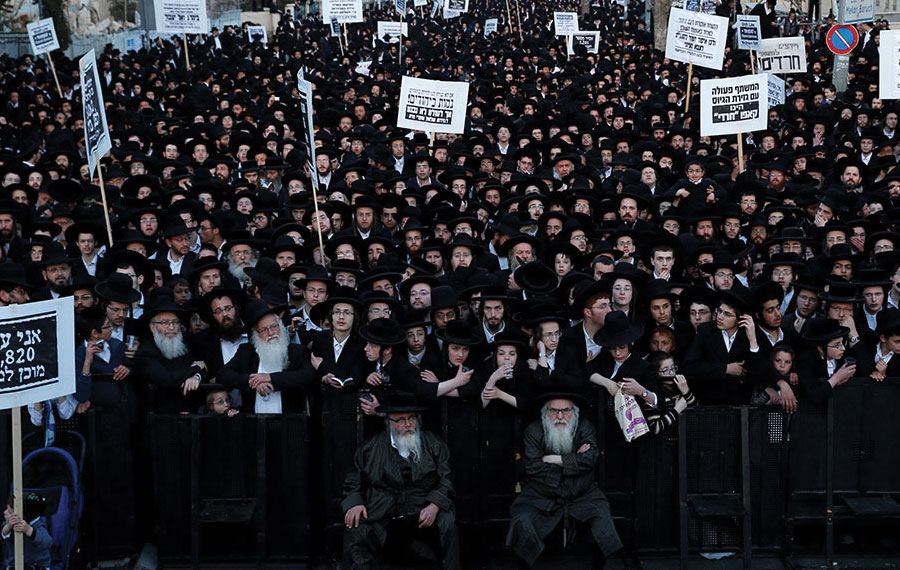 Photo by Baz Ratner/Reuters
Photo by Baz Ratner/Reuters Last week, my column carried the headline “A Week Before Chaos.” This week I must call it a day before chaos — or not. As I write, there’s a political crisis in Israel and there’s a deadline to resolve this crisis: the night of May 29. That’s after the Journal goes to press. Thus, I will share with you three observations concerning this crisis, which addresses whether Israel has a new government or is forced to call a new election.
Perception and Reality
What is the essence of the crisis? Observers see it in one of two ways: They believe what the politicians say, or they believe that what the politicians say is determined by a hidden agenda. There are two ways to view Avigdor Lieberman’s sudden decision not to accept a compromise and insist on passing a draft law of Charedi soldiers without even a slight change. There are two ways to view why Charedi leaders wouldn’t just accept the proposed law without change.
Does Lieberman want to pass legislation because he truly believes that’s the best thing for Israel, or is it because he wants to (take your pick) torment Netanyahu, sabotage the coalition, get more seats, position himself as a leader of a certain faction, or all of the above? And what is the motivation behind the Charedi insistence on changing the law? Is it because they truly believe the law endangers their way of life, or (take your pick) want to showcase their power, have internal political problems, climbed a tree and can’t climb down, or all of the above?
Question of Priorities
The Charedi draft is like climate change. There is a relative consensus that the current situation is unsustainable. There is broad agreement that something must change. There are even certain remedies that many Israelis would agree on. However, there is lack of political will to implement these changes.
And, no, this isn’t because of politicians’ misbehavior. It’s because of voters’ misbehavior. Although voters say and feel (and there is a plethora of data to support this argument) that they want change, at the polls, they vote against change. Why? Because they prioritize other things over the Charedi draft, such as wanting the right wing to rule, such as wanting a coalition that would support settlements, such as not believing members of the centrist camp are truly centrist, not leftists.
Lieberman decided to offer these voters an interesting alternative: an unquestionable right-wing agenda and a path to correcting course on the Charedi draft. By doing this, much more than challenging the Charedi parties, he is challenging Likud. His message to right-leaning, nationalistic voters is simple: Likud gives you only half of what you want. I will give you both.
The Charedi draft is like climate change. There is a relative consensus that the current situation is unsustainable.
The Looming Charedi Crisis
If there is a new election in Israel or not; if Netanyahu keeps his seat or not; if the Charedis win or lose this round; if the next coalition passes the draft law or not, the issue of Charedi integration isn’t going anywhere. The following two paragraphs describe it in a nutshell. They are taken from the forthcoming translated version of my latest book (with professor Camil Fuchs) “#IsraeliJudaism: Portrait of a Cultural Revolution.”
Charedi society presents a challenge to Israel in three respects: economically, for failing to integrate and contribute; defense, for dodging the burden of the military draft; culturally, for trying to enhance religious coercion in the public space. But Israel also presents a challenge to Charedi society in several ways. For many years, the leaders of the Charedi public have successfully coped with their surroundings by means of a certain model, centered on the preservation of a socially isolated and culturally fortified space. It is precisely the success of this model that clarifies why Charedim resist attempts to impose change on them. If the model works, it is not worth revising.
The external and internal pressures on Charedi society to change are, however, growing. They are intensifying from the outside: The Charedi population is growing rapidly, and it is becoming increasingly difficult to provide for them on the backs of other taxpayers. The pressures are also intensifying from the inside: The young generation is pained by its estrangement from Israeli Jewish surroundings; it’s also searching for a way to improve its living conditions and alleviate at least some of the tensions damaging their relations with other sections of society.
Shmuel Rosner is senior political editor. For more analysis of Israeli and international politics, visit Rosner’s Domain.























 More news and opinions than at a Shabbat dinner, right in your inbox.
More news and opinions than at a Shabbat dinner, right in your inbox.